To Hi-Res or Not to Hig-Res?
It’s been just short of a month since my last post. Even in times when I remain pretty close to home, I’m still pretty busy. I managed to get my 15 year old Euphonix System 5 digital console up and running for a new studio tenant. About 4 years ago, I disassembled it and put all of the modules up in the attic area of my building after a different tenant failed to learn how to use it. They didn’t want to boot up a recording console. And I’ve been studying a lot – getting ready for my final pilot oral exam and check ride. I’m pretty close to getting my Private Pilot Glider Certification. I passed the written exam and have been flying once a week all summer. Soaring in active thermals at 10,000 feet plus in the mountains north of Los Angeles is a guaranteed way to forget about all of the challenges that exist back on the ground. Big fun. Finally, I’ve spent the last week or so writing up my 2020 AES Convention presentation/paper. And it’s finally finished and submitted.
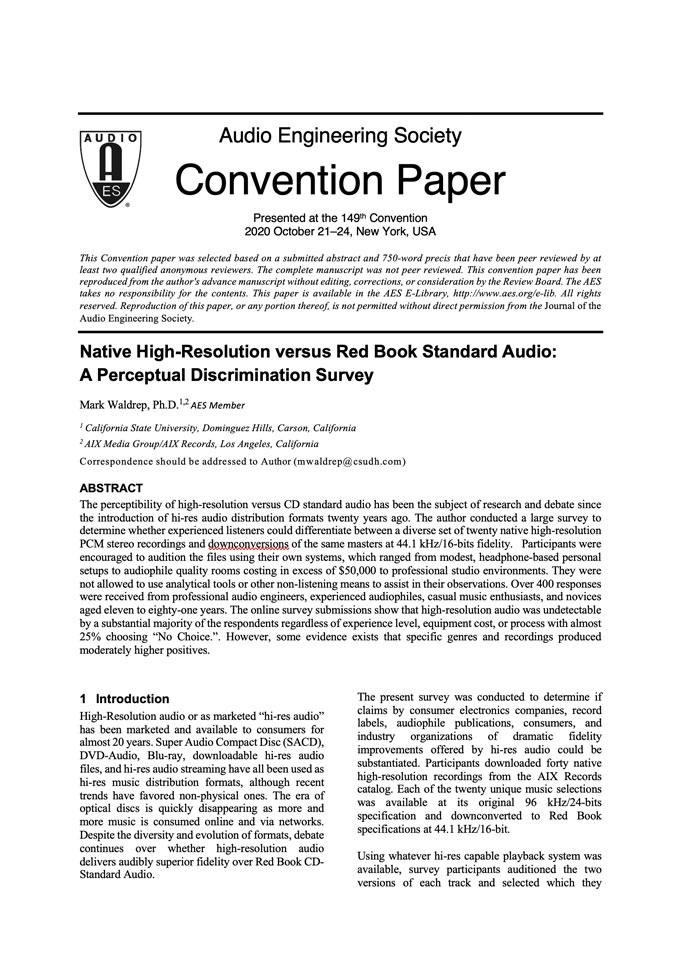
With the help of a couple of readers with experience in statistics (thank you Robert and Sergio), the raw data from 428 submissions to the HD-Audio Challenge II have been preliminarily analyzed and graphed. There were 6181 data points (the number of individual selections of hi-res vs. CD spec audio). Almost 23% of the submissions selected NO CHOICE. Determining which version of the track was actually high-resolution was impossible for almost a quarter of the participants. Others didn’t listen to all 20 of the tracks. And while some of the tracks produced moderately better results than others, the data supports the conclusion that the probability of successfully selecting a hi-res audio file over a CD downconversion of the same track is no better than flipping a coin — 50%. And remember this was done using real high-resolution audio tracks NOT digitized classic recordings from the golden era of analog tape.
Hi-Res Matters … and It Doesn’t
The results of my survey will be hard or impossible for many to accept. Those with a financial stake or vested interest in “hi-res” audio will continue to perpetuate the myth. I’ve had a few polite back and forth exchanges with David Solomon, the evangelist for Qobuz, on one of the FB audio groups that focuses on high-resolution audio. His contention — and one that I completely agree with — is that using high-resolution audio to produce new recordings makes a difference. He bolsters his position with “testimonials” from respected audio engineers and producers including Grammy-winning Bill Schnee and Cookie Marenco. Their arguments are well-founded and true but they do not conflict with the findings of my survey. How can hi-res audio absolutely make a difference and according to my own survey be indistinguishable from standard-res audio?
Because we’re not talking about the same thing. David and his group are focused on one end of the production chain and I’m dealing with the other end. Making a recording requires a lot of individual steps. There’s time spent in the studio or at a live venue capturing performances through microphones, preamps, and preserving them on recording devices — analog or digital. Additional vocal or instrumental parts are then layered on to the “basic tracks” over the course of weeks or even months. And finally, the individual tracks are blended, tweaked, and balanced into a surround or stereo mix – called the mixdown stage. At the end of the process, a mastering engineer assembles the album, applies EQ and compression, and adds the metadata to the final files prior to replication or distribution. All of this should ideally happen in high-resolution. Why?
Because one of the primary goals of the audio engineers working on the project is to record the instruments and vocals in the best quality possible. You can always make a recording with lots of fidelity sound worse but you can’t go the other way. When the artist is singing or playing a new part, the engineer can only guess at how loud the artist will sing or play. Having 24-bits affords recording engineers additional “headroom” before excessively loud moments overload some part of the signal path, distort and sound terrible. Using 24-bits provides over 120 dB of potential signal to noise specifications. Increasing the sampling rate helps with filtering and analog to digital conversion. Moving to high-resolution during the production phases of a commercial recording project makes all the sense in the world.
But engineering a new album project in a professional recording studio is very different than playing back a final mastered, released track in your own home on your own system. As the HD-Audio Challenge II clearly demonstrated, playing back music in “hi-res” audio — with sample rates higher than 44.1 kHz and word lengths longer than 16-bits — doesn’t provide any perceptible fidelity improvement over using Red Book standards. The industry will continue to try and defend “hi-res” audio and market ever higher specifications because they want us to purchase new “hi-res” equipment, subscribe to pricier music services, and buy our favorite music all over again. But signing up for the highest tier of Spotify or buying Blu-ray music discs won’t make any difference in your music enjoyment.
If I were an evangelist for a “hi-res” streaming service or the head of marketing for a digital music download site (wait a minute I am responsible for iTrax.com, the first high-resolution music download site), I would have a hard time acknowledging and accepting the results of the HD-Audio Challenge II survey. As someone that has championed hi-res audio for over a decade, the results directly contradict many of the articles on this site. But I didn’t manipulate the data to conform to my previous position of advocating for hi-res audio. I wanted to know if real world audiophiles could hear the “dramatic” improvement in fidelity claimed by NARAS, the DEG, CTA/CEA, music services, and the music labels. I’m satisfied that hi-res doesn’t matter as a final delivery format. However, it does matter while Bill Schnee, Cookie Marenco. or I are making new recordings. We can all be right. And audiophiles should understand the facts.
A Little Help for a Bicyclist’s KS Campaign?
Last fall, I received a call from an inventor seeking my advice and help with a crowdsourcing campaign he was planning. Gordon MacMorran is a lifelong and avid bicyclist. He saw a need and has designed a unique, modular bicycle cargo system to make hauling stuff on bikes much easier. His invention, Pedal Porteur, has gone through all of the necessary prototype stages, preliminary tooling creation, cost analysis, and practicality testing. I was impressed last fall when I first went to visit him and I remain impressed today. I offered some advice, encouraged him to do outreach, start building an email list, and begin posting regularly on social media. I even recorded and edited the voice over for his pitch video. He launched the campaign on August 25, 2020 and he’s well over halfway to his goal.
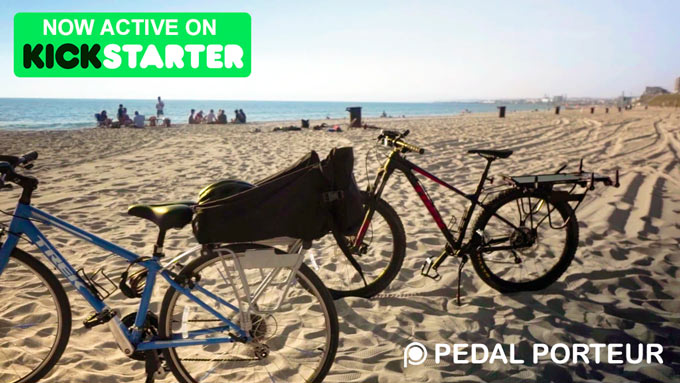
If you’re a bicyclist or know someone that is, check out the Pedal Porteur Kickstarter page and consider becoming a backer. In an age when moving away from fossil fuels can help save our planet, anything that makes human powered transportation easier should be a part of the plan. Too bad someone recently walked off with my bicycle or I’d be among Gordon’s first backers. Thanks.
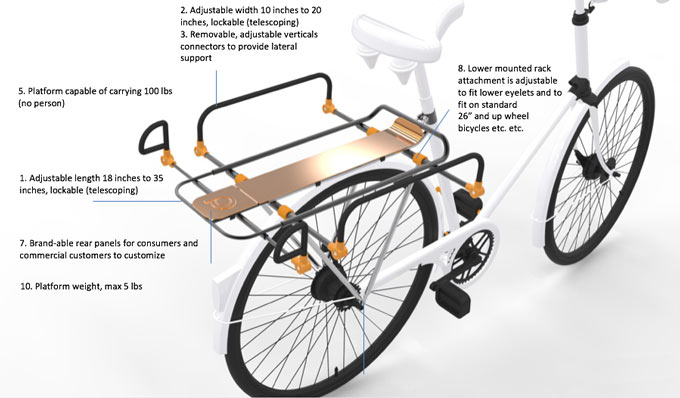
Back to School Special
Another academic year has begun. I started presenting lectures through videos and from the campus studio last week. In recognition of the new semester, I’m offering a 50% discount on physical copies of the Music and Audio book. Now is the perfect time to read what has been called, “the gold standard” in audio reference books. Use coupon code “School50Percent” at check out.
Get the ULTRA HD-Audio 2017 AIX Records Sampler FREE
In addition to receiving the book, I’ll include a copy of the AIX Records 2017 HD-Audio Sampler for FREE. That’s a $25 value.
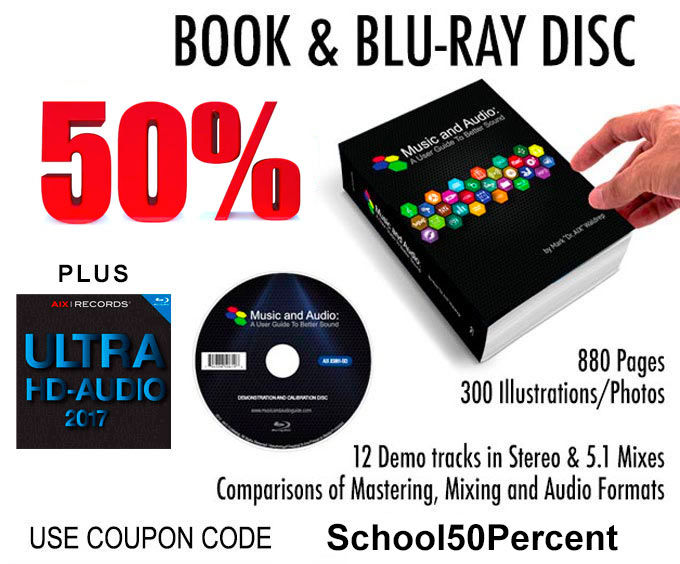

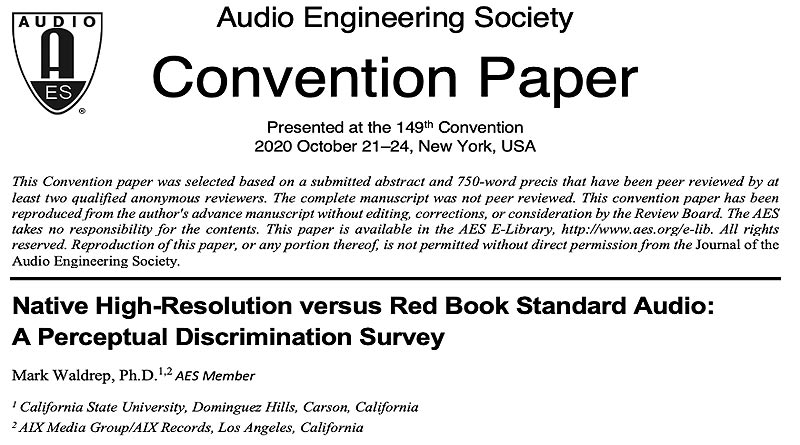
Hi Mark
Well done on the submission to the AES. Your findings support the plethora of other controlled tests that arrive at the same conclusions but you go one better by ensuring the test material are all true hi res recordings.
I recall back when I did some consulting in the 1990s when ‘hi res’ was becoming commonplace in studios. For production it certainly had many advantages over the then 16 bit or analog processing – the former lacking headroom and the latter adding noise and loss to each stage.
Back then the audio engineers simply referred 24 bits as 24 bit. The term ‘hi res’ came a bit later from marketing departments of labels and consumer hardware, We could not see (or hear) and advantages 24 bit provided in playback and saw the marketing as you describe, another cash grab by the industry to tempt consumers to purchase their music again.
Sometimes the hi res product did actually sound better than their previous CD or analog releases as a result of better mastering or going back to better tape sources, but that has nothing to do with ‘hi res’ – these improved masterings could have been released on CD without the price premium.
Mark—I just sent this e-mail to my wife (who’s right here with me, in the next room)…
KG—As I think you know, the audio trade is characterized by extremes. There are lots of know-nothing ass holes, and lots of snake oil promoters spreading (and selling) bullshit to the ignorant legions—but also some knowledgeable engineers that communicate realistic, fact-based information. One of the prominent members of this latter category is a guy named Mark Waldrep, aka “Dr. Aix”, who has done some excellent work in debunking much of the phony stuff. His periodic tech advisories are always intelligent, well documented, and generally refreshing; in short, he’s a really good guy.
His latest communication is here…https://6kneh.r.ah.d.sendibm4.com/mk/mr/OGcvlKYLSbK1PQT_aHlfjui_X5Ab1KFwQuagGZv1A6AbQHgcwqlsaot9HDkedo0r5r9r23D0rUNp7n-Q0XuwNAPevw0Ogy0VMSFyYCkteWOOeIDxQnP7qJeLdwRF81lHLzsmD0s
Now I know that you’re not interested in reading any audio-tech stuff, but please scroll down to the part that’s headed “Personal Challenges” and then read from that point to the end.
I really feel awful about what has happened to this guy—and so fortunate that I’m not Mark!
BG
Mark—I’ve also posted some audio-related white papers, and they’re at… https://classicalcandor.blogspot.com/2020/05/audio-tech-talk.html
Thanks Bryan. I appreciate it. I’ll survive and maybe even thrive going forward. Something about the toughest metal being forged in the hottest flame?